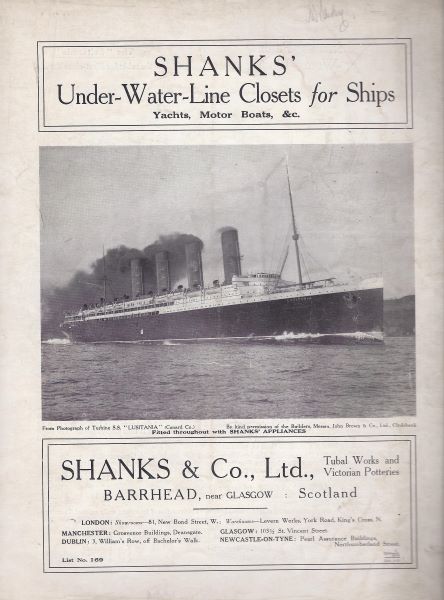

The Marine Trade
The Marine Trade
When John Shanks invented the No. 39 underline ship’s closet, he opened the door to a lucrative section of the market: marine trade.
Shanks & Co. became the leaders in this field, supplying sanitary fittings for most of the big passenger liners of the early 20th century (including The Titanic), and securing naval contracts for war ships and even submarines.
By 1918, they were doing so much marine work that a new department was formed, and T. M. McInnes who was originally head of the Drawing Department was put in charge.
The early 20th century was the era of the large Atlantic passenger liner. However, Shanks & Co. was not the only company chasing these lucrative contracts. It managed to secure the contract for The Lusitania but lost The Mauretania to a competitor. However as time went on, Shanks began to secure the majority of marine work, and become the leader in the field.

We are all familiar with the tragedy that befell The Titanic and in The First Hundred Years, Gilbert Shanks recalls hearing the news of its sinking:
In April 1912, the whole nation was shocked to learn that The Titanic, the largest ship in the world, on her maiden voyage to New York had struck an iceberg and sunk, with an immense loss of life. We had received the order for the greatest part of the sanitary equipment for the ship, and I can well recall the regular visits T.M. McInnes paid to Harland & Wolff, Belfast to discuss and settle all the details of the goods. We could not therefore, help but feel a sense of personal loss at her sudden and tragic end.
In 1934, Shanks supplied the largest part of the sanitary fittings to The Queen Mary and in 1938 The Queen Elizabeth’s sanitary fittings were exclusively Shanks & Co. However, this part of the trade was not destined to last. As the 20th century moved on aeroplanes took over from the passenger liners as the common way to travel.

However, trade still continued in other shipping, and in 1953 the Merchant Shipping Act increased the requirements for sanitary fittings for ships’ crews. The company also continued to secure large scale naval contracts, and one former member of staff remembers that these contracts meant you could “write your own cheque.”
